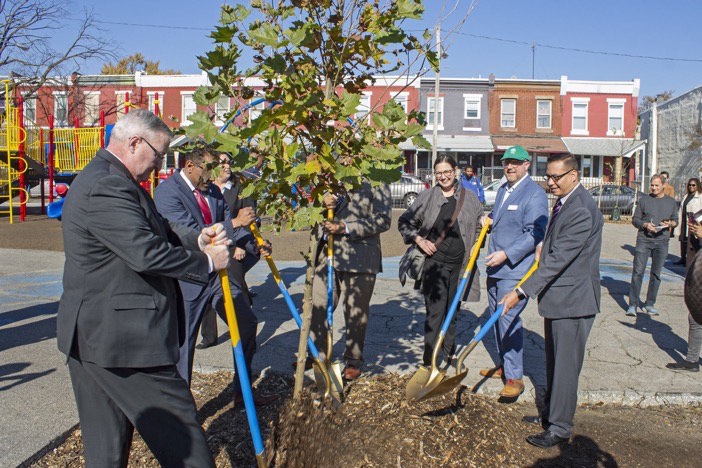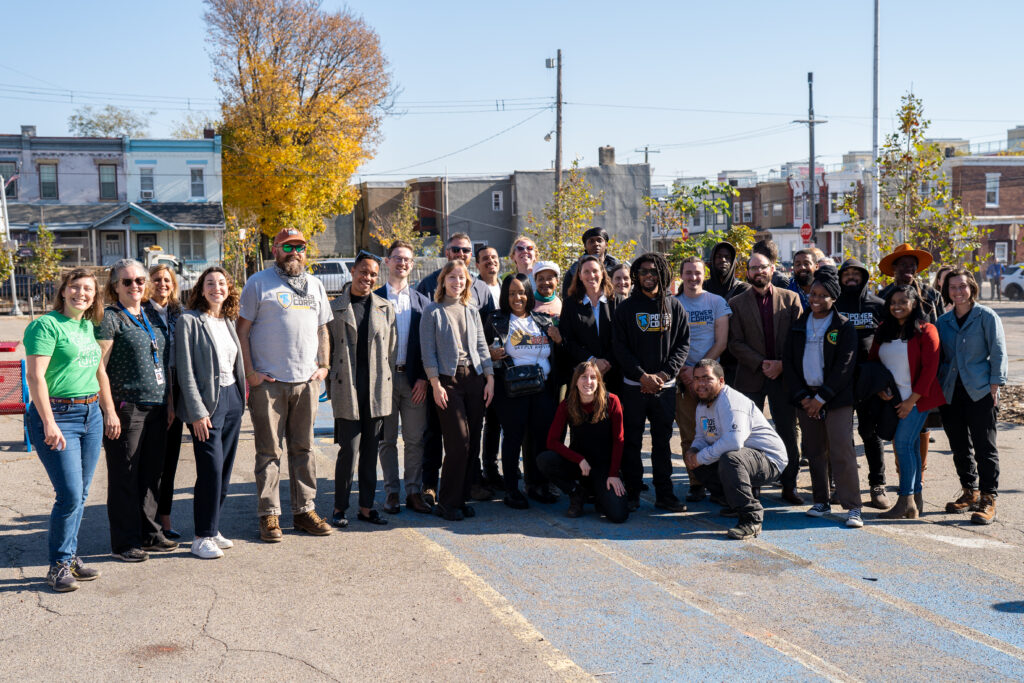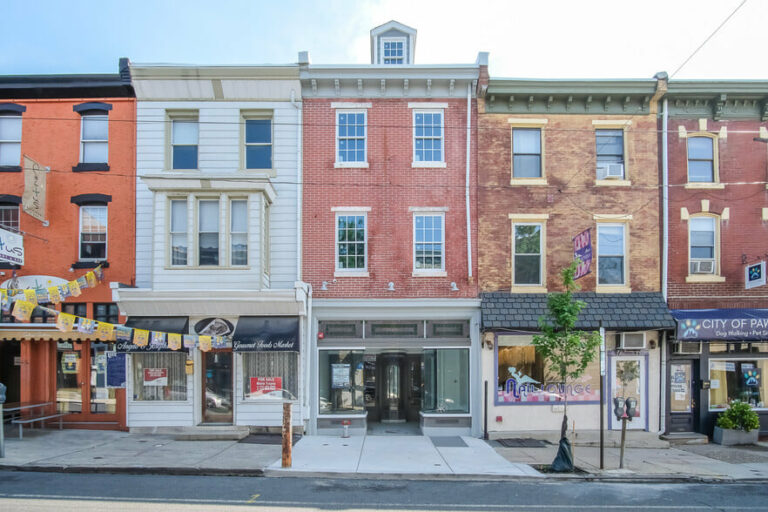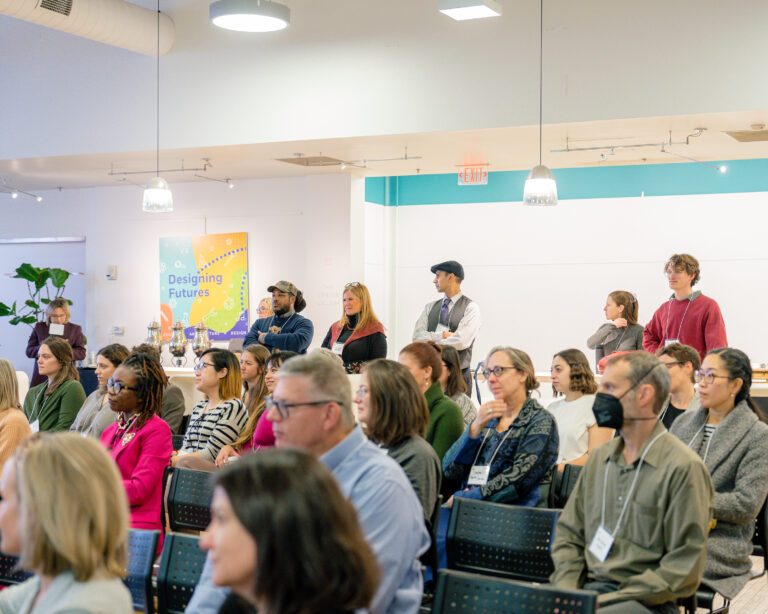The Sustainable Business Network of Greater Philadelphia (SBN), along with the City of Philadelphia, Public Health Management Corporation, Pennsylvania Horticultural Society, Fairmount Park Conservancy, PowerCorpsPHL, and School District of Philadelphia will work together toward equitable growth and care of the city’s tree canopy.

PHILADELPHIA – The City of Philadelphia’s Department of Parks & Recreation (PPR) and Office of Transportation, Infrastructure, and Sustainability (OTIS) joins Public Health Management Corporation (PHMC), and partners the Pennsylvania Horticultural Society (PHS), Fairmount Park Conservancy (FPC), PowerCorpsPHL, the School District of Philadelphia (the District), and the Sustainable Business Network of Greater Philadelphia (SBN) to celebrate a $12 million grant award from the United States Department of Agriculture Forest Service to go toward the Philly Tree Plan. Together, the partners gathered on Thursday, November 16 at James Rhoads School in West Philadelphia to plant trees in celebration of the grant.
President Biden’s Inflation Reduction Act, the largest climate investment in history, distributed more than $1 billion in grant funding to nearly 400 projects across the U.S. This historic investment will increase equitable access to trees and nature, which will cool city streets, improve air quality, and promote food security, public health and safety.
The $12 million grant is a first step toward full implementation of the Philly Tree Plan, the first comprehensive plan to equitably grow and care for Philadelphia’s urban forest. The grant will allow public and nonprofit partners to scale up existing urban forestry operations and programs, create new programs, and support community groups, businesses, and local projects to deliver immediate impact in high-priority, low-canopy areas of Philadelphia. Critically, the funding provides for the creation of a new Philly Tree Coalition, a first-of-its-kind entity that will oversee additional fundraising and programs as part of the Philly Tree Plan. The Philly Tree Coalition will be housed within the Pennsylvania Horticultural Society, and will coordinate the ecosystem of public, private, not-for-profit, and community group activities around urban tree planting and stewardship in Philadelphia.
Between 2008-2018, the City of Philadelphia lost six percent of its tree canopy, equal to 1,000 football fields. Centered around a 10-year implementation roadmap and 30-year tree canopy growth projections, the Philly Tree Plan is organized around the following goals:
- Coordinate support for trees
- Protect the existing and future urban forest
- Grow the urban forest equitably across the city
- Reduce the burden of trees on residents
- Invest in people and communities
- Communicate with residents and improve customer service
- Advocate for communities to benefit from the urban forest
- Celebrate and support the ways communities are engaging with trees
“Every Philadelphian deserves to live in a community with the shade, clean air and beauty that a healthy tree canopy provides,” said Mayor Jim Kenney. “The Philly Tree Plan sets an ambitious vision for what we can achieve by focusing our resources on green infrastructure and planning for the long-term care and maintenance of the millions of trees that give Philadelphians shade and keep our air and water clean.”
The Philly Tree Plan identifies seven priority geographic areas where City and nonprofit partners should increase investment in tree planting and maintenance efforts. These areas were identified using environmental justice criteria including tree canopy cover, heat exposure, air quality, income and asthma rates. Activities funded by the $12 million USDA Forest Service grant will be focused in these seven priority areas.
“Healthy, well-cared-for trees are an important part of safe, thriving communities,” said Philadelphia Parks & Recreation Commissioner Orlando Rendon. “This grant represents a huge investment in our city’s urban forest, and will allow us to set up systems and programs to support residents in planting and caring for trees in the lowest-canopy neighborhoods.”
The grant will boost street tree planting as well as tree canopy in open spaces. “We are always looking for inventive ways to improve the safety of our streets for all Philadelphians. Street trees have been shown to calm traffic by creating a narrowing presence on a road,” said Mike Carroll, Deputy Managing Director for the Office of Transportation, Infrastructure, and Sustainability (OTIS). “This funding will allow for tree-friendly infrastructure along the High Injury Network (HIN), or the identified corridors with the highest rates of fatalities and serious injuries per mile.”
Increasing the tree canopy cover around schools will substantially improve the quality of life for many children. Schools and campuses across the city have an average of 17% in tree canopy cover, which is less than the citywide average of 20%. Schools in the priority-identified areas of the city that will be targeted by this investment have just 5.5% tree canopy.
“Schools are an integral part of our Philadelphia communities and serve as areas where students, parents and community members can gather and connect,” said Tony B. Watlington, Sr., Ed.D., Superintendent of the School District of Philadelphia. “As one of the largest landowners in Philadelphia, the School District knows that increasing the tree canopy around schools will positively impact the health and well-being of our students. Thanks to this incredible investment, we will be able to increase the tree canopy cover by planting 1,000 trees over the next five years.”
PHMC will provide oversight of the grant’s administration, and engagement of community members, civic leaders and elected officials, and will act as a fiscal intermediary between the funder and project partners.
“This project goes to the heart of PHMC’s mission of building healthy communities by improving public health and safety,” said PHMC Interim President and CEO Mike Pearson. “The livability of our city depends on a healthy and well-cared-for urban forest that protects from heat, improves mental and physical health, and is a key tool in combating climate change.”
The recommendations in the Philly Tree Plan include input from more than 9,000 residents, including a Community Voices Committee composed of 28 resident leaders, who guided the project from start to finish and held the plan accountable for the needs of their community. The plan lays out opportunities for planting more trees in priority neighborhoods and addresses perceived barriers to tree planting, like the need for effective maintenance and removal of hazardous trees.
The Pennsylvania Horticultural Society (PHS) has long been a champion and leader of tree planting and stewardship throughout the city and region. Each year, PHS helps to plant over 3,000 trees through its nationally recognized PHS Tree Tenders program, which enlists a network of hundreds of volunteers to increase tree canopy across the city. With support from this grant, PHS will scale up PHS Tree Tenders in priority neighborhoods, and create a new paid tree care program. PHS will also assume a new leadership role by becoming the home of the newly formed Philly Tree Coalition, which will coordinate implementation and fundraising efforts around the Philly Tree Plan.
“PHS is thrilled to take this important step to further our shared goals under the Philly Tree Plan of equitably increasing tree canopy in priority neighborhoods in Philadelphia,” said Matt Rader, President of the Pennsylvania Horticultural Society (PHS). “A robust tree canopy is a must-have component of healthy neighborhoods, and this grant will enable us to significantly scale up activities in places experiencing the most inequitable health outcomes. We are excited to be the home of the Philly Tree Coalition, a new venture that will be responsible for bringing together a vast network of partners to bring the Philly Tree Plan to life.”
Philadelphia’s forests and natural areas make up 60% of the city’s parkland, and 34% of its total tree canopy. These areas are vital to the livability of our city, and provide opportunities for Philadelphians to escape into nature for recreation and relaxation. The Fairmount Park Conservancy works in partnership with PPR to plant and care for thousands of trees each year in the city’s watershed parks.
“Thanks to this transformational grant, Fairmount Park Conservancy plans to dramatically expand our natural lands restoration and maintenance efforts, enhance the tree canopy in the communities that need it the most, and provide a critically timed investment in our key watershed parks,” said Maura McCarthy, Ph.D., Chief Executive Officer of Fairmount Park Conservancy. “This kind of sustainable approach ensures that our green spaces heal our ecology and our people, and build a resilient future for all.”
This $12 million investment in Philadelphia’s urban forest includes investment in its people. Many Philadelphia residents and businesses are ready to be a part of the workforce that will grow and support the urban forest. Expanding access to employment opportunities and providing clear pathways to full-time careers in urban forestry is one of the most important ways the Philly Tree Plan and this grant can have a lasting impact on communities.
“From deep collaboration with the community to strengthening partnerships around a collective goal to embedding equity and economic opportunity into each step, the Philly Tree Plan is a best-in-class action plan to make a big, lasting impact in Philadelphia,” said Julia Hillengas, Executive Director of PowerCorpsPHL. “This grant enables us to grow the city’s canopy—and our talent and resources to care for it for generations to come.”
“In addition to making improvements to Philadelphia’s tree canopy, the Philly Tree Plan will also enable local businesses to make catalytic investments in their own communities, thereby improving climate resilience and economic growth outcomes,” said Devi Ramkissoon, Executive Director of the Sustainable Business Network of Greater Philadelphia. “SBN has a long history of supporting local businesses in the financing, education and technical support they need to thrive, address their communities’ needs, and boost equitable economic growth. Our participation in this diverse partnership will allow us to expand our proven model in a way that has an enduring impact in the city.”
The City and its partners will continue to pursue additional funding to ensure the Philly Tree Plan is fully implemented, and to work to build a resilient and equitably distributed urban forest in Philadelphia that helps residents thrive in every neighborhood.

About Philly Tree Plan
The City of Philadelphia released the Philly Tree Plan in 2023. It is the city’s first-ever urban forest strategic plan. In support of citywide equity and sustainability goals, the plan set a 10-year strategy to grow, protect and care for Philadelphia’s tree canopy, and it established new ways of working with residents to combat climate change.
The plan also provides recommendations to the City and its partners to coordinate and strengthen their work on tree planting and maintenance, and find the role policy can play to support a more tree-friendly culture across the city.
Photos courtesy of The City of Philadelphia’s Department of Parks & Recreation




